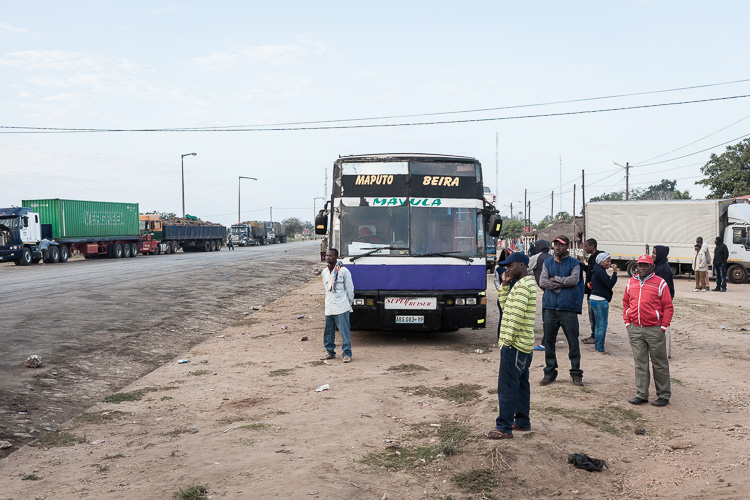
The summer of 2014 was the deadliest month for the EN1 highway in Central Mozambique. It’s a troubled road in an armed conflict between the government and its main opposition RENAMO. Together with two friends I traversed, under a military escort, the 100 kilometers between the two villages Save and Muxungue. This is my report…
About a week before we would finally hit this road, we were already in the capital to do the first research. On a particular day at sunset we hitchhiked to the main bus station to see if we could get any direct information about the armed conflict from some bus drivers operating on that route. After less than a minute we found our first sign: a bus with a bullet hole. We located the driver, who then showed us a bus who suffered a similar faith. He told us how one woman had died earlier that month, but things had settled down over the recent days. The drivers themselves had never been too scared to stop driving. “We need to earn money somehow”, one of them told me.
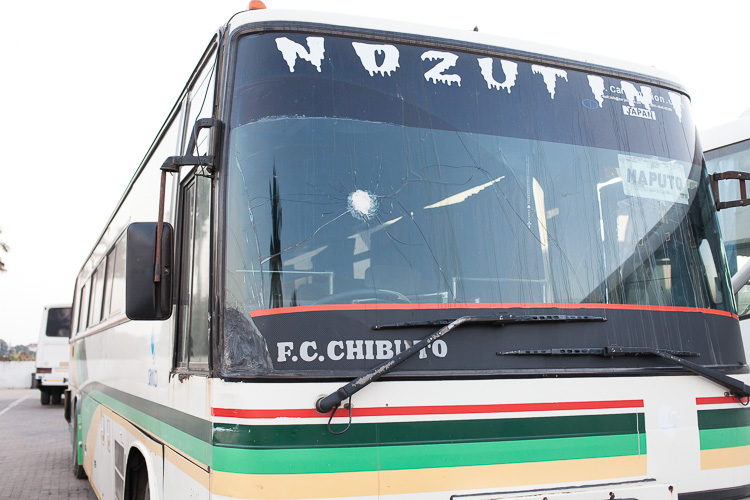
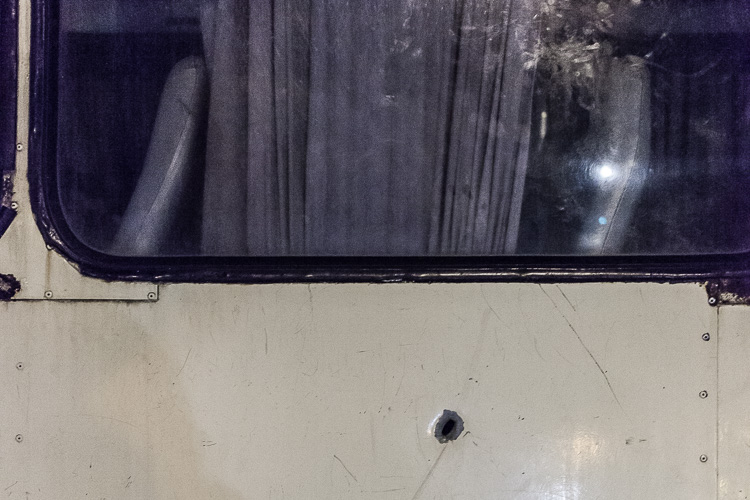
Any saint would advise us against travel over this road, but I felt like it was the only option to get to Zimbabwe in an acceptable time while also allowing for some adventures on the way.
So, combined with that I was already following some news websites for a few weeks, I found out that in the previous two weeks there had been no more reported attacks. I couldn’t be entirely sure because I might had missed some of the news, but also due to the update from the bus drivers in Maputo in the end we decided to go for it.
Save river
So, after a few relaxing days in the touristy beach village of Tofo, on the 21st of July (2014) we were the only ones on our way north towards the Save river. From the Internet I knew this was where the bus would stay overnight until the bridge opened up the next morning. There wasn’t anything to do there since we were basically just staying over at the side of a road. The conditions were really rough (even for African standards), which made us decide to rent a small hut with a tiny double bed nearby and stay in it with the three of us. We experienced an interesting and a bit scary night, with drunk soldiers and Justin Bieber screaming out of the loudspeakers keeping us awake all night.
In the early morning we walked back to the bus, only to find that it would still take hours before we could finally cross the bridge. After some time, even though it wasn’t really allowed, I decided to shoot a movie and explain the situation:
Soon after, we crossed the bridge. The bus we were in looked exactly like the one which appeared on a South African news website. Apparently, one month earlier passengers used it to hide behind the wheels when the column came under attack in a cross fire.
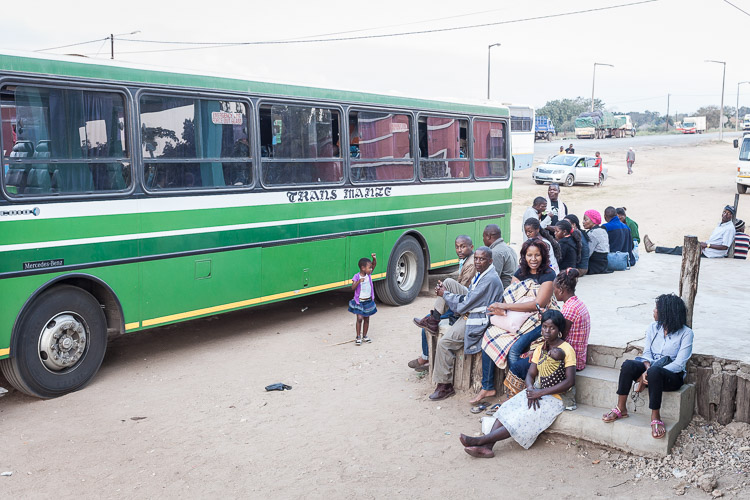
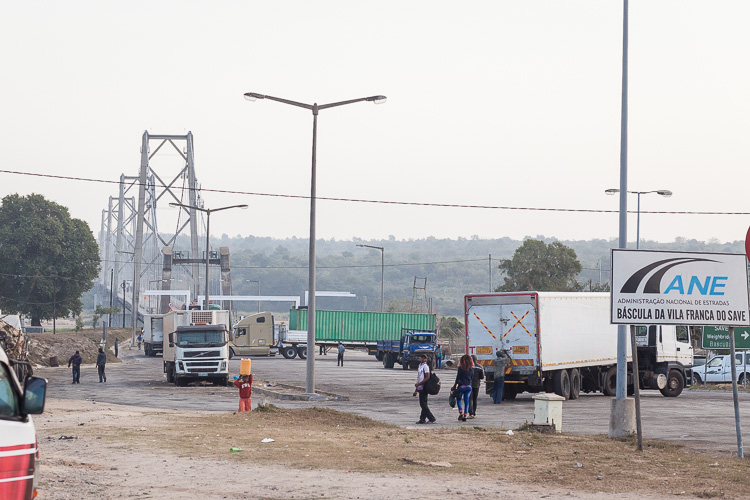
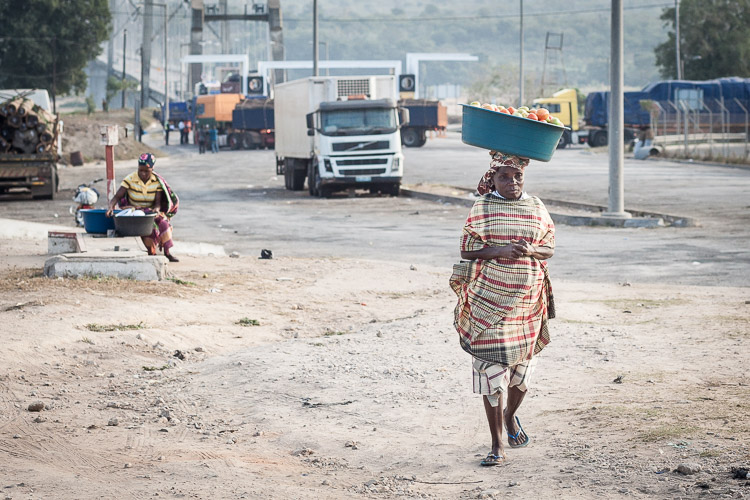
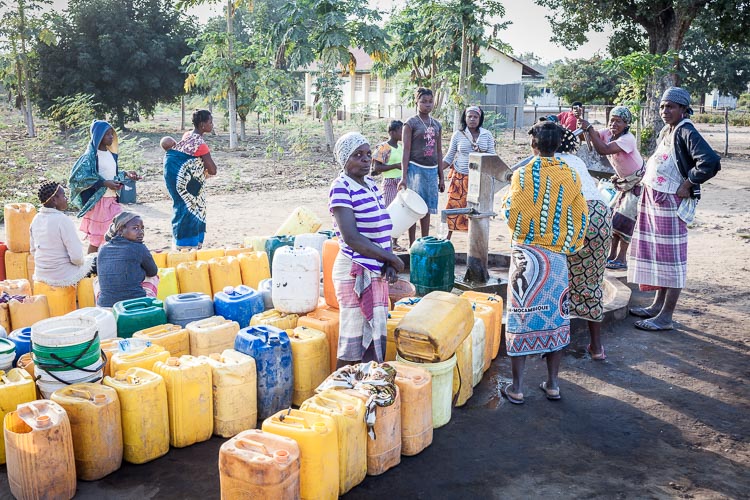
Unfortunately, after we had finally left I could not take out my camera anymore as people around me told me I would be jailed if I would film any of the things. Assuming that Mozambicans are quite used to some problems in their country, I took this advise serious and therefore did not take too many photos. The only thing I can still share is some pictures of our convoy slowly building up (see later below).
We crossed the bridge around 8:00AM, after which it still took a few good hours for the column to build up to about 200 vehicles. When the column from the other side finally arrived, I counted how it had came along with about 25 soldiers. Some were carrying Ak47s, others RPGs, some were masked while others weren’t. I am not entirely sure what happened then, but I assume each of them found a spot somewhere in the back of a few civilian pickup trucks. There were no army vehicles apart from one armoured personnel carrier (APC) with a heavy machine gun mounted on top. It never made me feel any safer though, since the guerrilla attacks before had always taken place from the dense bushes on the side of the road. Once those rebels would open fire, there would be no one to stop them from making their first victims.
The Military Escort
So it seemed that people that morning were tense and nervous, a feeling that only increased when the military escort finally started on July 21st, 11:00 AM. After the column from the other direction had passed us, we were next. I had no idea if they had been attacked, but at this time we already had no other option of getting back anyway. This was the time.
A chaotic scene emerged with trucks and buses hastily trying to overtake each other like maniacs. Ten minutes later all of the sudden the whole convoy stopped. I was thinking whether we had already hit an improvised road block. My ears were on high alert to notice potential shots being fired. Hours before, I had decided not to take a seat directly at the window, hoping it would provide me some protection. I also placed my DSLR, made of a solid magnesium alloy, strategically around my heart in case a bullet would fly in. Looking at my other friends, I could see how they were extremely nervous yet calm. We knew things had been alright the days before, which was a comforting feeling.
The column started moving again. We passed by several burned out vehicles over a damaged and windy one-way road. We passed several military checkpoints during the next two hours. Finally we overtook the front APC and shortly after ran into an army of people trying to sell us fruits, coconuts and drinks. It marked the end of the escort. We had finally arrived in Muxungue. Later we would arrive in a hostel in Chimoio, our final stop before heading to Zimbabwe.
In that hostel, the owner (a lovely German lady) could not believe how we had travelled the route and got out safe. In the previous year she had accommodated a few backpackers who ended up in a crossfire. One girl even saw how the woman sitting next to here died. Reportedly she arrived in total panic at the hostel hours later. Unfortunately, as the hostel owner told us, these travellers never informed themselves on the travel conditions in the country. It was a tragic mistake: they ended up travelling the road during the deadliest month of all with attacks carried out almost every day. For sure they will remember the journey for the rest of their lives.
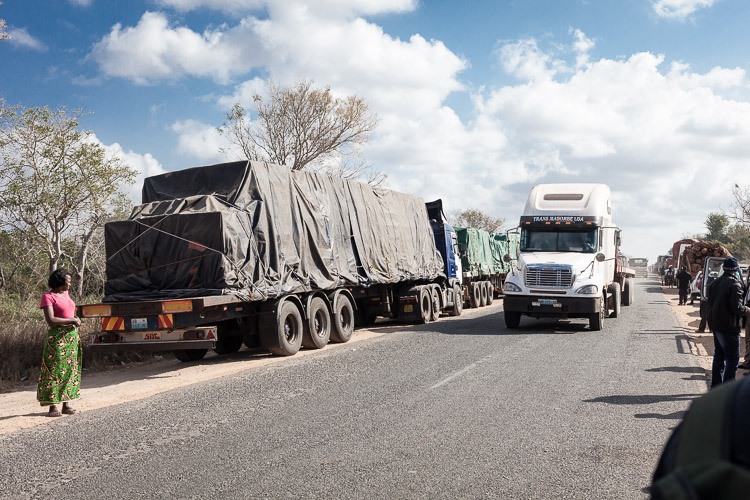
Do I regret taking this route, was I lucky to have survived? Well, as others might say: life is dangerous. Together with my friends we made an informed decision whether or not to travel this road. I think that when the locals say that things are stable again, there should be no reason not to travel this road again. There are too many beautiful places in this world to stay at home being afraid of what might happen!
As things have settled down even more and a peace deal was signed, this website reports that since August 28th 2014 there are no more military escorts between Save and Muxungue.
[Update 20 February 2016: Armed escorts have been re-introduced again. Read the article here for more info.]